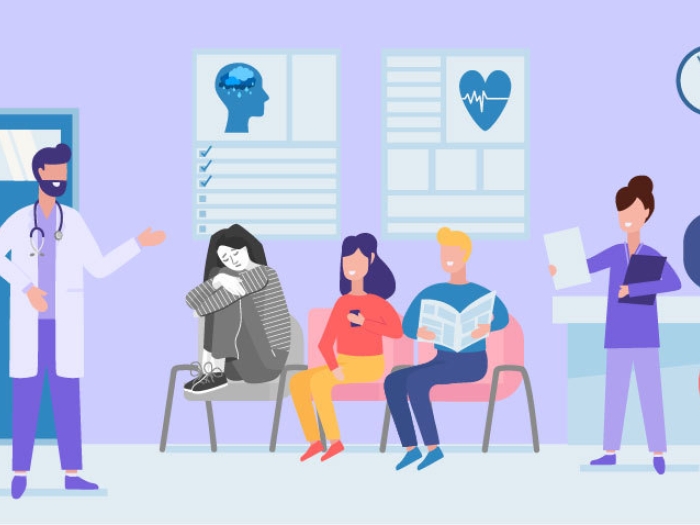New guidelines addressing adolescent mental health as part of routine primary care offer many benefits, a U-M expert says.
4:00 PM
Author |

The American Academy of Pediatrics released new guidelines this year designed to help doctors identify, evaluate and manage depression in youth.
Chief among the suggestions: a universal depression screening for all patients ages 12 and older.
That may involve administering the PHQ-9, a nine-question survey used to detect the presence and severity of depression in a primary care setting, and screening for any associated suicidal ideation.
LISTEN UP: Add the new Michigan Medicine News Break to your Alexa-enabled device, or subscribe to our daily audio updates on iTunes, Google Play and Stitcher.
The first update to the guidelines in a decade, they're endorsements that Nasuh Malas, M.D., MPH, considers beneficial for providers and patients alike.
"Many primary care and other pediatric providers receive limited training on adolescent depression and its management," says Malas, the director of pediatric consultation and liaison psychiatry services at University of Michigan C.S. Mott Children's Hospital. "Furthermore, depression can present in a variety of ways in adolescents, and youth with physical illness are at higher risk of depression.
"Depression can present mixed with anxiety, potential substance use, psychosocial stressors and academic or other health difficulties."
Although the guidelines could make more work for primary care providers, the reason to do so is compelling.
As many as 1 in 5 teens experience depression during adolescence, according to the AAP, with up to three times higher risk in youth with chronic illnesses such as asthma, obesity, cystic fibrosis, cancer, inflammatory bowel disease or seizure.
But depression in young people often goes unrecognized or untreated — presenting an opportunity for pediatricians to spot problems early and guide families toward treatment.
These guidelines help create a culture of safety and normalize that this is a part of care.Nasuh Malas, M.D., MPH
The guidelines, which Malas believes were broadly written so doctors might tailor their approach to each patient, can provide assistance in supporting the social, emotional and behavioral needs of youth and their families.
"Depression is a risk factor for suicide, substance use, worsening school performance and poor health," Malas says. "This is a critically important indicator for primary care providers and a wonderful resource to support holistic and high-quality care for youth in primary care settings."
Malas, in his own words, offered some takeaways on the guidelines for doctors.
Why pediatric depression screenings are necessary
Teens are less likely to speak up
Adolescents are still forming their identity and understanding of their internal environment. They may have difficulty expressing what they're feeling.
Young people tend to seek out support from peers, not parents or adult providers. Most adolescents are "avoidant copers." They repress or avoid complex emotions and thoughts — and therefore delay seeking help.
They're also harder to diagnose at times
One of the primary reasons is that the manifestations of adolescent depression may not be as pronounced and as classical in their presentation as you would see in adults. There's more of a dysregulated emotional affective and behavioral response in some youth.
MORE FROM THE LAB: Subscribe to our weekly newsletter
Young people tend to have more irritability, and they tend to have a lot of social conflict as manifestations of their depression.
Providers could be missing cues
The pediatric practice is busy, and it's challenging to see youth alone or dedicate appropriate time to mental health needs, given time constraints.
Screening can normalize the discussion of mental health, provide more targeted discussion and is time-efficient, often requiring only minutes to complete.
If you're not actively screening, you're going to miss a number of youth with depression or at risk for depression that may benefit from preventive strategies, early intervention or treatment.
Family stigmas can affect care
Parental perception of mental health has a significant impact on care. Families often underestimate how much is going on and may feel vulnerable from these discussions, resulting in them not seeking support for their youth.
If a kid is aggressive or has ADHD (i.e., externalizing behaviors), parents — as well as teachers and other professionals — will usually pick up on that.
SEE ALSO: One Medical Student's Mission to Erase the Stigma of Depression
But if a young person is anxious or depressed (i.e., internalizing symptoms), that's more of an internal expression and may not be as readily evident or can be misattributed by family as normative coping or other factors.
Screenings build doctor-patient trust
Child mental health services are unfortunately limited, and pediatricians are often at the front lines of identifying and managing pediatric depression. These guidelines help create a culture of safety and normalize that this is a part of care.
Unless it involves a safety or suicide risk, providers typically try to keep that information confidential with the patient to build trust and allow youth to speak freely about their experiences and emotions. Providers can identify their needs and meet the patient and their family where they're at.
Next steps can be addressed
If you get a positive result, I would advocate mentioning that this is a screening we do on all youth, to normalize the care being provided.
I like to use screening as a way to frame the conversation ... usually some further verbal screening regarding depressive symptoms but also other associated risks based on each child's unique presentation, including discussions of anxiety, suicide, substance use and any type of trauma or abuse as warranted.
That's why the guidelines express the importance of having trusted mental health providers to call, to be able to collaborate with pediatricians and support higher levels of mental health care as needed.
Early action has lasting benefit
If we have conversations, communicate and intervene earlier, we may be able to stem the progression of depression later in life. We may be able to avoid intensive services or pharmacology if addressed early with good individual, familial, environmental and psychotherapeutic supports.
SEE ALSO: How Doctors Can Provide Better Care for Transgender Patients
Other youth may need medications to address their depression or other associated psychiatric needs. The goal is to promote the well-being, quality of life, development and full potential of the child or adolescent and to support them as much as possible to address the debilitating effects of depression.
It's a much better approach than waiting until someone is acutely at risk, including the risk of declining school performance, social isolation, high-risk behaviors or even suicide. Intervening early can also stem progression of depression to more severe forms and support the best overall care for youth.

Explore a variety of health care news & stories by visiting the Health Lab home page for more articles.

Department of Communication at Michigan Medicine
Want top health & research news weekly? Sign up for Health Lab’s newsletters today!





